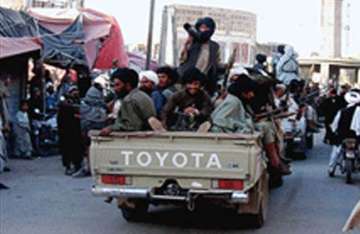Pakistan Govt, ISI Still Supporting Taliban: Report
Pakistani military intelligence not only funds and trains Taliban fighters in Afghanistan but is officially represented on the movement's leadership council, giving in significant influence over operations, a report said. The report, published by the

Pakistani military intelligence not only funds and trains Taliban fighters in Afghanistan but is officially represented on the movement's leadership council, giving in significant influence over operations, a report said.
The report, published by the London School of Economics, a leading British institution, on Sunday, said research strongly suggested support for the Taliban was the "official policy" of Pakistan's Inter-Services Intelligence agency (ISI).
Although links between the ISI and Islamist militants have been widely suspected for a long time, the report's findings, which it said were corroborated by two senior Western security officials, could raise more concerns in the West over Pakistan's commitment to help end the war in Afghanistan.
The report also said Pakistani President Asif Ali Zardari was reported to have visited senior Taliban prisoners in Pakistan earlier this year, where he is believed to have promised their release and help for militant operations, suggesting support for the Taliban "is approved at the highest level of Pakistan's civilian government."
A Pakistani diplomatic source described that report as "naive," and also said any talks with the Taliban were up to the Afghan government.
"Pakistan appears to be playing a double-game of astonishing magnitude," said the report, based on interviews with Taliban commanders and former senior Taliban ministers as well as Western and Afghan security officials.
Violent regions
The report said interviews with Taliban commanders in some of the most violent regions in Afghanistan "suggest that Pakistan continues to give extensive support to the insurgency in terms of funding, munitions and supplies."
"These accounts were corroborated by former Taliban ministers, a Western analyst and a senior UN official based in Kabul, who said the Taliban largely depend on funding from the ISI and groups in Gulf countries," the report said.
Almost all of the Taliban commanders interviewed in the report also believed the ISI was represented on the Quetta Shura, the Taliban's supreme leadership council based in Pakistan.
"Interviews strongly suggest that the ISI has representatives on the (Quetta) Shura, either as participants or observers, and the agency is thus involved at the highest level of the movement," the report said.
The report also stated that Pakistani President Zardari, along with a senior ISI official, allegedly visited some 50 senior Taliban prisoners at a secret location in Pakistan where he told them they had been arrested only because he was under pressure from the United States.
"(This) suggests that the policy is approved at the highest level of Pakistan's civilian government," the report said.
Afghanistan has also been highly critical of Pakistan's ISI involvement in the conflict in Afghanistan. Last week, the former director of Afghanistan's intelligence service, Amrullah Saleh, resigned saying he had become an obstacle to President Hamid Karzai's plans to negotiate with the insurgents.
In an exclusive interview with Reuters at his home a day after he resigned, Saleh said the ISI was "part of the landscape of destruction in this country."
"It will be a waste of time to provide evidence of ISI involvement. They are a part of it. The Pakistani army of which ISI is a part, they know where the Taliban leaders are -- in their safe houses," he said.